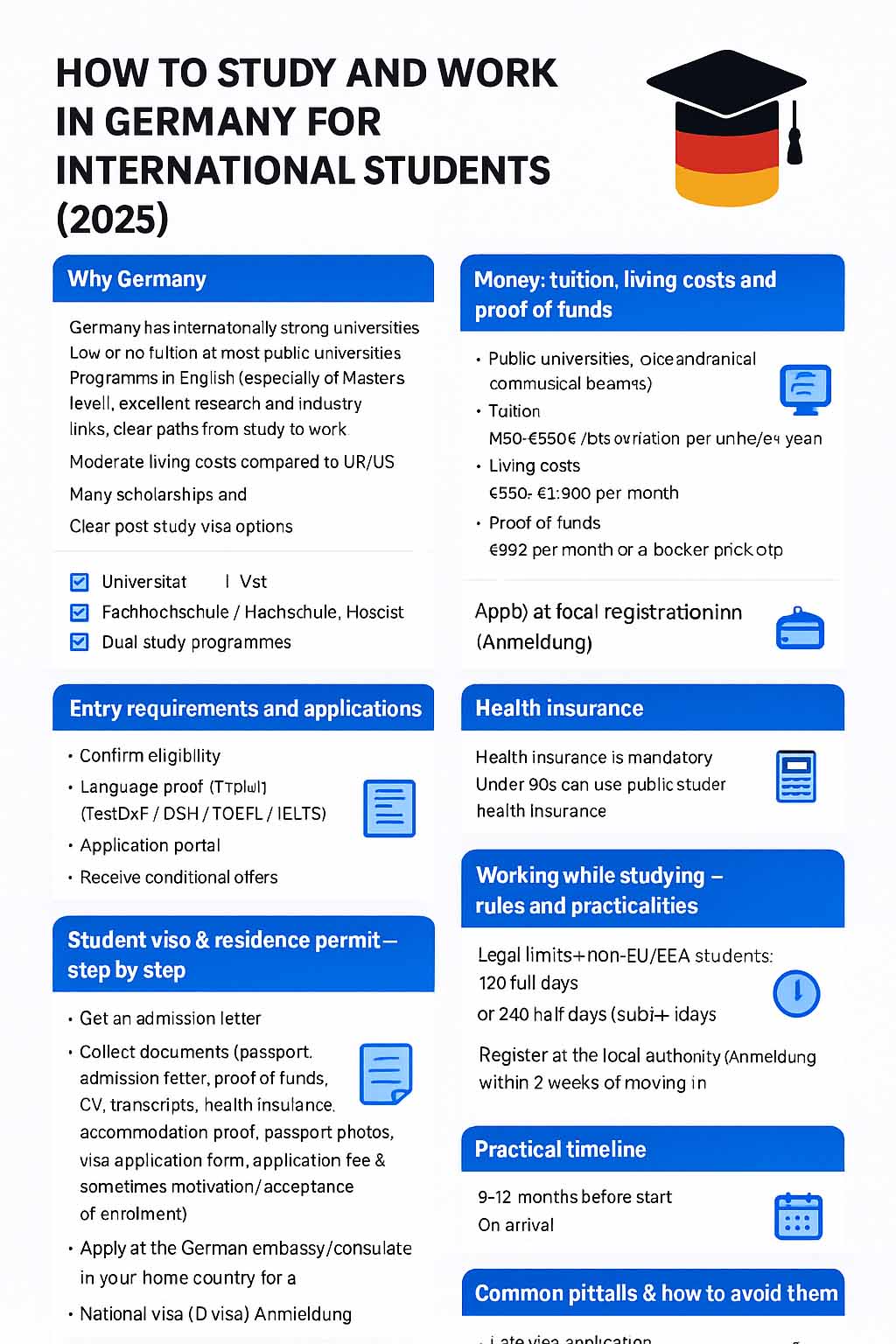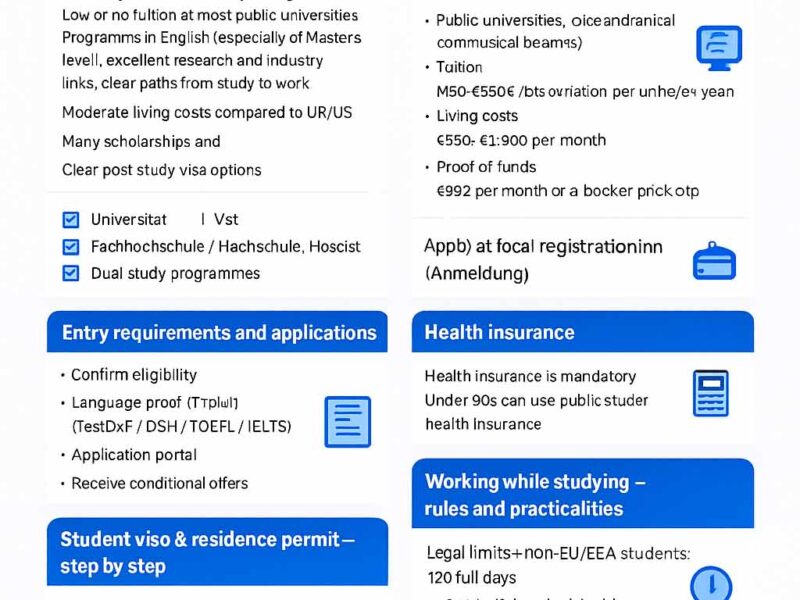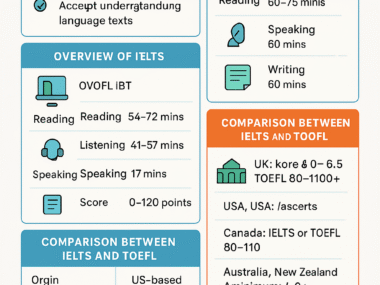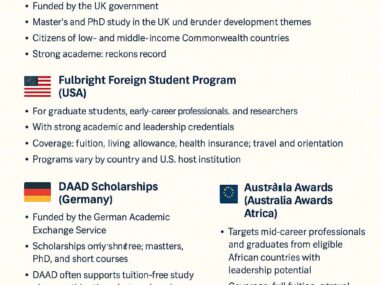HOW TO STUDY AND WORK IN GERMANY FOR INTERNATIONAL STUDENTS IN 2025

- Why choose Germany for study & work
- Types of programmes and how to pick the right university/course
- Admissions & language requirements
- Money: tuition, living costs, and proof of funds (blocked account etc.)
- Student visa and residence permit: application steps and documents
- Health insurance, bank account, accommodation, registration (Anmeldung)
- Working while studying: limits, types of work, taxes & social security
- Internships, mandatory placements, and work integrated learning
- After graduation: jobseeker / opportunity residence permits, EU Blue Card and staying long-term
- Practical timeline, tips, and a printable checklist
Why Germany (For work & study)
Germany remains one of the world’s most attractive study destinations because it combines internationally strong universities, low or no tuition at most public universities, many programs in English (especially at Master’s level), excellent research and industry links (engineering, IT, life sciences, business), and clear paths from study to work. Living costs are moderate compared with the UK/US and there are many scholarships, plus clear post-study visa options for international graduates. Public universities typically only charge administrative/semester fees rather than tuition for many programmes.
What to study and where to apply
Pick the course that matches your career plan — Bachelor (undergrad), Master (postgrad), PhD, or vocational training (Ausbildung). Germany has:
- Universities (Universität) – research-oriented, academic programmes (BSc, MSc, PhD).
- Universities of Applied Sciences (Fachhochschule / Hochschule) – practice/industry-focused, strong for engineering, IT, business.
- Berufsakademien / Dual study programmes – combine paid work and study (good for getting hired by a company).
How to choose:
- Check program language (German vs English). Many MSc programmes are offered in English; most Bachelors require German.
- Look at industry links and internships embedded in the program.
- Consider city and living cost (Munich/Hamburg/Bonn higher; mid-sized cities lower).
- Check entry requirements (GPA, subject prerequisites, language certificates).
Useful portal: DAAD database and university websites list the program language and exact requirements.
Entry requirements and applications
Typical application steps:
- Confirm eligibility (your high-school/university diploma must be recognized; sometimes a prep year or Studienkolleg is required).
- Language proof: for German-taught programs you’ll usually need TestDaF / DSH or certificate (e.g., Goethe) at the level stated by the uni (often B2/C1). For English-taught programs, TOEFL / IELTS (IELTS/TOEFL REQUIREMENTS FOR INTERNATIONAL STUDENTS) or equivalent is usually needed.
- Application portal: Many public unis use UniAssist for international applicants or the uni’s own portal. International master’s may require transcripts, CV, motivation letter, reference letters, and proof of relevant bachelor degree.
- Conditional offers: If you get a Letter of Admission (Zulassungsbescheid), you’ll use that for your visa application.
Tip: Apply early — start 6–9 months before the course start date (winter semester usually begins in Oct; summer semester in April). Deadlines can be as early as January–July for the autumn intake depending on programme.
Money: tuition, living costs and proof of funds
Tuition
- Public universities: Most German public universities do not charge tuition fees to international students for undergraduate and many postgraduate degrees — though administrative/semester fees (student services, public transport ticket, admin) usually apply (typically €100–€350 per semester). There are exceptions: some federal states (e.g., Baden-Württemberg) charge tuition for non-EU students at some universities, and private universities charge tuition.
Living costs and proof of funds
- Living costs: plan ~€850–€1,200 per month depending on city (student towns cheaper, Munich/Hamburg more expensive).
- Proof of funds for visa: To get a student visa you must show you can cover your living costs — typically by showing a blocked account, scholarship award, or formal sponsor. In 2025 the standard monthly figure used by German authorities is €992 per month (~€11,904 per year) as the baseline for living costs; check the embassy site for the exact amount for your country and the current figure at time of application. If using a blocked account, open it and deposit the required annual amount before submitting the visa application.
Practical note: Don’t assume the same blocked-account provider for everyone; compare fees and transfer times.
Student Visa & Residence Permit — step by step (high level)
If you live outside the EU/EEA, the typical path is:
- Get your admission letter from a recognized German university.
- Collect documents: passport, letter of admission, proof of funds (blocked account or scholarship), CV, academic transcripts, proof of health insurance, accommodation proof (if possible), passport photos, visa application form, application fee, and sometimes motivation/acceptance of enrolment. Official lists differ by embassy — always check the German embassy/consulate in your country.
- Apply at the German embassy/consulate in your home country for a National Visa (study) (long-term D visa to enter and start studies). Embassies typically require an interview and original documents. Processing times vary (start early!).
- Arrival & local registration: After arrival in Germany, register at the local Residents’ Registration Office (Anmeldung). Then apply for a residence permit for study at the local Foreigners’ Office (Ausländerbehörde) — this permit allows you to live and study in Germany for the duration of the course.
Important: Once you’re in Germany on a study visa, the residence permit formalities are local and the Ausländerbehörde controls extensions.
Health insurance
Health insurance is mandatory for all students. If you’re under 30 (or under certain credit limits), you can usually use public student health insurance (gesetzliche Krankenversicherung) at reduced student rates. Older students or certain categories may need private insurance. For visa purposes you need proof of coverage when applying. Follow the guidance from your university and the embassy.
Housing and registration
- Accommodation: Apply early to student dorms (Studierendenwerk) and also search private rooms (WG = shared flat), private student halls, or sublets. Big cities have tight markets — start 3–6 months ahead.
- Anmeldung (registration): Within 2 weeks of moving into your accommodation you must register at the local Bürgeramt (Anmeldung) — you’ll receive a Meldebescheinigung which you will need for many administrative tasks (bank, SIM card, permit).
Working while studying — rules and practicalities
International student work rules are a common concern. The most relevant items (2025):
Legal limits
- Non-EU/EEA students can work up to 120 full days or 240 half-days per year (this is often expressed as 120 “full days” or 240 “half days”) OR the equivalent rule mostly used is 140 full days or 280 half days in some sources — however the widely used practical limit for employment during the semester is 20 hours per week to avoid social security obligations. During semester breaks you may work full time. Always check the exact figure cited by the Ausländerbehörde or your employer because counting full vs half days matters for the visa.
- EU/EEA/Swiss students have the right to work under the same labour laws as Germans with fewer restrictions.
Practical consequences
- Working under 20 hours/week usually keeps you exempt from mandatory full social security contributions (employee health/pension), and keeps your status as a student. Working more than 20 hours/week typically means your job is considered regular employment and may change insurance/tax status.
- Student assistant jobs (HiWi), internships, teaching/tutoring, hospitality, retail are common. Internships that are mandatory as part of your course are treated differently and usually allowed without counting against the 120-day cap.
Taxes & social security
- If you earn above the tax threshold, you’ll pay income tax; employers also handle social security contributions when hours exceed certain thresholds. Mini-jobs (earning up to €520/month in 2024–25 range; thresholds change) are popular because they often mean no payroll tax for the employee — check the current mini-job earning cap. If you work as an employee you’ll get a payslip and tax ID. Always register for tax/insurance correctly.
Internships, placements, and practical training
- Mandatory internships (Praxissemester or internships required by your syllabus) are typically allowed and do not always count against the student work quotas (but verify with your university/foreigners’ office).
- Voluntary internships shorter than 3 months may count towards your work day limit — always confirm.
- Employers often prefer graduates who have completed an internship in Germany — internships are a good pathway to employment.
After graduation — staying and working in Germany
One of the biggest advantages: Germany offers clear post-study options.
Jobseeker / Opportunity residence permit
- Graduates of German institutions can apply for a jobseeker residence permit (often called the 18-month jobseeker permit or Opportunity Card extension) to look for employment related to their degree. The exact title and duration may depend on your qualification and regulatory changes; commonly you may get up to 18 months to find a job after graduation (this period allows you to search for work and take up qualified employment). During this period you may work with fewer restrictions.
Employment and EU Blue Card
- Once you get a qualified job offer, you can apply for a work residence permit or the EU Blue Card (if salary threshold and qualification criteria are met). The Blue Card offers a faster path to permanent residency for high-earning professionals. Salary thresholds change regularly — check the current figure applicable in 2025.
Permanent residency
- After a period of working in Germany (time varies by permit type, language level and social contributions), you may apply for permanent settlement (Niederlassungserlaubnis). For Blue Card holders the time is shorter (often 21–33 months with sufficient salary and language level).
Practical timeline (from decision to arrival)
- 9–12 months before start: Choose programmes, check requirements, prepare documents (transcripts, language tests).
- 6–9 months: Apply to universities (earlier for competitive programs). Start blocked account process if needed.
- 4–6 months: Receive admission. Gather visa documents and make embassy appointment.
- 2–3 months: Embassy interview and visa application. If visa delays occur, contact the university for deferrals.
- On arrival: Anmeldung, open bank account, apply for residence permit, sign up for health insurance, attend orientation.
Common pitfalls & how to avoid them
- Late visa application — embassy wait times can be long. Apply as soon as you have the admission letter.
- Wrong proof of funds — embassies are strict. If a scholarship or sponsor covers your funds, provide the correct form (Verpflichtungserklärung). For blocked accounts, ensure deposit is complete and the confirmation included.
- Language overconfidence — many administrative tasks and job markets still favour German. Even in English programmes, learn basic German early (B1/B2 greatly increases job prospects).
- Housing — don’t rely on finding a room in the first month. Look early, use student housing offices and WG portals.
- Work hours confusion — track days and hours; count full vs half days for the visa rules to avoid violating permit conditions.
Money-saving & career tips
- Apply for scholarships (DAAD, foundations, university grants).
- Use student semester tickets for cheap transport.
- Get a mini-job for flexible income while you study.
- Network early: career centers, alumni, local meetups and LinkedIn are important.
- Learn German while studying: free or low-cost language offers are often available through Unis or municipal Volkshochschulen.
Useful resources & where to check rules
- Official government & embassy pages — your primary source for visa requirements and the current blocked account amount. (Consulate/Germany.info pages often provide downloadable PDFs about student visa rules).
- Make-it-in-Germany for official guidance on study & work rules, skilled immigration and post-study permits.
- University admissions pages and DAAD — program specifics, language, and application processes.
- Student organizations / Studierendenwerk — for housing, part-time jobs and social services.
- Bank/block account providers — check times and fees.
Ready-to-use checklist (printable)
Before applying:
- Choose programme and language; check uni deadlines.
- Confirm recognition of your qualification (or Studienkolleg requirement).
- Book language test (TestDaF/DSH/TOEFL/IELTS) in time.
- Prepare transcripts, CV, motivation letter, reference letters.
After admission:
- Open blocked account OR secure scholarship OR obtain formal sponsor letter. (Confirm the current required annual amount with the embassy.)
- Apply for national student visa at German embassy/consulate.
- Arrange health insurance for visa application.
- Book accommodation / temporary stay for arrival.
On arrival:
- Register (Anmeldung) at local authority.
- Apply for residence permit at Ausländerbehörde.
- Enrol at university and get semester ticket.
- Open German bank account and tax ID (Steuer-ID).
- Look for part-time work / internships via career center.
Before graduation:
- Talk to the Ausländerbehörde about jobseeker permit and next steps.
- Attend university career events and polish CV in German/English.
Final practical tips
- Even a B1 German level makes daily life significantly easier; B2 helps for many jobs.
- Keep copies (digital and physical) of all migration documents — universities or employers will ask.
- If you change employers or job hours, inform the Ausländerbehörde if it affects your permit conditions.
- Use student counseling and international offices — they’re geared to help with visa, jobs and housing.
- Keep your resume (Lebenslauf) and LinkedIn up to date and tailored to German formats (photo optional, clear structure).
Where to verify right now
Rules and monetary thresholds (blocked account amount, working day counts, mini-job earning caps, Blue Card salary thresholds) are updated from time to time, so before you apply check:
- The German embassy/consulate page for your country (visa rules and document lists).
- The Ausländerbehörde and university international office when in Germany.
- Make-it-in-Germany for official summaries of jobseeker and immigration pathways.
Key citations (most important)
- Official embassy/pdf guidance on student visa and the monthly living amount (blocked account) — Germany info / embassy PDF.
- Make-it-in-Germany guidance on study & work and post-study permits (jobseeker/opportunity card).
- Practical working-hours guidance and student job rules (studying-in-germany.org and student services pages).
- Tuition & semester fee information for public universities (studying-in-germany.org / Expatrio / TopUniversities).
![]()



